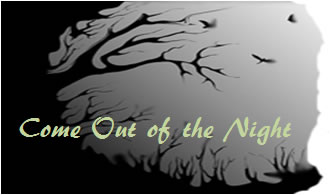A Story of
Two Fires
by Terry Smith
This is a story of two fires. One burns in the world, the other is fueled by Christ. With Christ it is never too late to say we are sorry. When we do say we are sorry, we can be born-again, get a fresh start, begin a totally new life; we can stand at a different fire warming ourselves in the love of God. It is a story of Christ's preoccupation with mercy, mercy on each one of us, and how, if it is the last thing He does, just as it was on Calvary, He will extend His wonderful love, even to our cold hearts.
The story begins on a cold, dark night in the judgment hall of Jerusalem. The day is the day of Christ's betrayal. Peter, that impetuous apostle full of zeal for God, has just cut off the ear of one of the soldiers who came to the Garden to apprehend Jesus, and has followed, afar off, Jesus to the hall where our Lord would be judged as a blasphemer. Jesus has already warned Peter what would happen, but Peter, confident in his own strength, has ignored Christ's prophecy and has rushed headlong into the "lion's den".
"Then took they him, and led him, and brought him into the high priest's house. And Peter followed afar off.
And when they had kindled a fire in the midst of the hall, and were set down together, Peter sat down among them.
But a certain maid beheld him as he sat by the fire, and earnestly looked upon him, and said, This man was also with him.
And he denied him, saying, Woman, I know him not.
And after a little while another saw him, and said, Thou art also of them. And Peter said, Man, I am not.
And about the space of one hour after another confidently affirmed, saying, Of a truth this fellow also was with him: for he is a Galilean.
And Peter said, Man, I know not what thou sayest. And immediately, while he yet spake, the cock crew.
And the Lord turned, and looked upon Peter. And Peter remembered the word of the Lord, how he had said unto him, Before the cock crow, thou shalt deny me thrice,
And Peter went out and wept bitterly." Luke 22:54-62
During Easter this story is recounted time and time again, as it should be. Peter's denial of Jesus is one of only a select few stories which are recounted in all four gospels. It shows Jesus's foreknowledge of everything that would happen concerning His death. It shows the weakness in man. This is the low point of the impetuous Peter's existence. That moment, in which Jesus turned and looked at Peter after Peter had denied Him three times, is one the most chilling in all of Scripture. Peter could do nothing but go out and weep bitter tears. Peter, in an act of unconscious symbolism, had stopped next to the fire of the world to get warmed. In the gospel of John it says, "And the servants and officers stood there, who had made a fire of coals; for it was cold: and they warmed themselves: and Peter stood with them, and warmed himself." In the hour of Jesus's total isolation, Peter, like all of us, stood with the servants and officers of this world. He had stopped to warm himself over the coals of this earth to get comfort from the cold. It is easy to picture him huddled over the fire of coals rapidly rubbing his hands together, hunching his shoulders, and exhaling frosting sighs into the cold, damp night air. He had already denied Christ; it was only a matter of time before it manifested itself.
Now all of us, whether Christians from an early age, or saved in middle age, have sought to find refuge from life's cold by warming ourselves at the coals of the fires that have been lit by the servants and officers of this world. Instead of seeking Jesus's face, a face that was in the judgment hall that night, Peter, like us, had stood with the world and its servants. Having been overtaken by the moment, having fallen into a great sin and condemnation of self, Peter left the hall and wept tears as bitter as any that have been wept in the history of Man.
But wait. …
This, remember, is a story, of two fires. A story of the wonders of Christ's determination and preoccupation for pouring out mercy and love on His people. In the final chapter of the four gospels, chapter 21 of John, Peter is drawn irresistibly to another fire of coals. This one prepared by Jesus. Jesus had already appeared twice to the disciples since his resurrection and now he was coming to them for the final time. Peter and five of the other apostles had been fishing all night and caught nothing. The story is familiar to us all. Jesus, (though they did not know it was him) appeared on the beach and told them to throw the net on the right side and they immediately gathered in 153 fish and dragged the net ashore. Peter, impetuous as ever, dove in the water and swam ashore, to meet his Lord. And the Scripture says,
"As soon as they were come to land, they saw a fire of coals there, and fish laid thereon, and bread.
Jesus said unto them, Bring the fish which ye have now caught...
Jesus said unto them, Come and dine. And none of the disciples durst ask him, Who art thou? knowing that it was the Lord.
"Jesus then cometh, and taketh bread, and giveth them, and fish likewise ...
So when they had dined, Jesus saith to Simon Peter, Simon Son of Jonas, lovest thou me more than these?” He saith unto Him, Yea, Lord; Thou knowest that I love thee. He saith unto him, Feed my lambs.
He saith to him again the second time, Simon, son of Jonas, lovest thou me? He saith unto him, Yea, Lord; thou knowest that I love thee. He saith unto him, Feed my sheep.
He saith unto him the third time, Simon, son of Jonas, lovest thou me'? Peter was grieved because he said unto him the third time, Lovest thou me? And he said unto him, Lord, thou knowest all things; thou knowest that I love thee. Jesus saith unto him, Feed my sheep."
This is the last time Peter would see his Lord and Savior in this world. And though Peter was troubled because Jesus asked him to affirm his love for Him it was nothing more than His love for Peter that prompted the exchange. Just as Jesus had prophesied, Peter had denied Him three times in His moment of isolation. Jesus, whom Peter testified here on the beach, knows all things, and Jesus knew this was Peter's lowest point, a point which he needed to have redeemed. For each time Peter denied the Lord, Jesus gave him a public opportunity to "buy it back" with open confirmation and testimony of his love. Each time Peter said that he loved Jesus, Jesus merely said, then feed my sheep. In other words, now that you have said it, all you have to do is prove it. Unlike the "fire of coals" that Peter had warmed his flesh at in that bleak moment of denial, this fire of coals was prepared by Jesus. Instead of humiliating him it fed Peter and redeemed his darkest moment. This was not a fire to warm oneself from the cold of the world, but it was a fire inviting a man to dine with God. The moment Peter dove into the waters to meet his Lord he was on his way to accepting the mercy that Jesus was preparing for him. Peter, as all men, did not understand Christ's mercy at first, but later we are certain that he did. One by one, Jesus cancelled those three denials and let Peter say, openly, "I love you Lord".
Jesus is so, so faithful. If it is the last thing He does, Jesus will redeem those people and things that need redemption. God is in the redemption business. His Son's blood has bought us back from death and sin. Like a pawnbroker, Jesus has bought back our lives with the redemption price of His blood. As with Peter, Jesus wants to redeem our past mistakes and sins, if only we will allow Him to do it. All we have to do is be born-again and repent and come to dine with Him. Come to the "fire of coals" where Jesus feeds us and lifts the guilt of the past away, allowing us to do good and righteous things that redeem our mistakes and sins and make us one of his true children.


